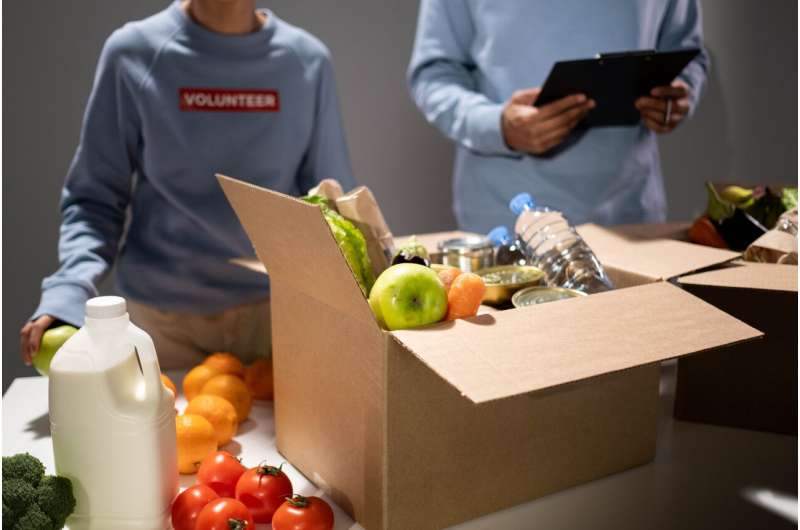This article has been reviewed according to Science X's editorial process and policies. Editors have highlighted the following attributes while ensuring the content's credibility:
fact-checked
trusted source
proofread
Study shows schools are providing 'fourth emergency service' by feeding families in desperate need

New research has exposed how food charity in schools is becoming mainstreamed across England amidst the cost-of-living crisis, welfare cutbacks, and entrenched poverty.
The findings, led by the University of Bristol and published in the British Educational Research Journal, show an expanding patchwork of school food banks, pantries and similar initiatives have been introduced to support families struggling to make ends meet and feed their children.
The spread of charitable food aid work led one head teacher to claim schools are now, "literally the fourth emergency service," with another support worker commenting, "We're seen as the universal service…because other services aren't there anymore."
Spiraling food and energy prices were reported to be compounding the issue of food insecurity, compelling schools to step in as a safety net in the absence of adequate welfare state support.
A primary school pupil cited in the research wrote a letter appealing to their school, which read, "We haven't got any gas. We haven't got any food for tonight, please can you help?"
Lead author Dr. William Baker, Senior Lecturer at the University of Bristol School of Education, said, "After years of austerity and cutbacks, rocketing food prices means millions of parents can't afford to feed their kids or heat their homes. Schools see the consequences of this every day, and many are responding by providing food to families through their own food banks and pantries."
"The project started locally but soon became national when it became clear these issues were widespread; it clearly shows how food support systems within schools are now well-organized and entrenched. Given the current situation, initiatives like food banks in schools are likely here to stay."
The research involved 25 schools nationwide, comprising primaries and secondaries in cities including London, Liverpool, Birmingham and Leicester, as well as smaller towns in urban, rural and coastal locations.
Most schools reported supporting 15–20 families on a regular basis, while several larger secondary schools in deprived areas were supporting more than 40 families a week with the food sourced via partnerships with major food waste charities and supermarkets.
Food aid operations were found to vary in size and structure, ranging from discreet food parcels given to parents and funded by staff donations to larger-scale, well-advertised regular provision with food supplied by large supermarkets and food waste charities. Examples of this included a free, help yourself pantry in the form of a shed next to the playground and a weekly stall set up at school pick-up time for parents to select what they need.
"It's striking and concerning how normalized and embedded the food aid had become within schools in England," Dr. Baker said.
The findings substantiate former Prime Minister Gordon Brown's recent observation that "as charities take over from the welfare state as our national safety net and the food bank, not the social security system, becomes the last line of defense against destitution, it is difficult not to fear for the future."
Interviews with staff involved in this work uncovered how many families are falling through cracks in the welfare system, for example those on Universal Credit who may not quite qualify for free school meal provision.
A support worker commented, "It's those on the borderline, that actually, they can't get free school meals, because they're earning £10 more than just above the threshold…so with everything else is going to happen, they're not going to be able to manage."
The scale of need extends beyond food, so schools have also been stepping in to provide clothes, shoes, and cleaning products.
Dr. Baker said, "Schools are often also supplying other essential items. Many staff I've spoken to attribute this need for support to broader cuts to services nationally and locally, with the cost-of-living crisis on top."
This heart-wrenching body of qualitative evidence backs up recent research by The Food Foundation, which found last September that a quarter (25.2%) of all households with children experience food insecurity.
Relatedly, a recent study by the Joseph Rowntree Foundation found almost 42% of families with more than two children routinely experience food insecurity. This partly reflects the two-child benefit cap, which restricts families with more than two children from receiving tax or Universal Credit for their third or subsequent children.
High levels of food insecurity is significant because it adversely affects educational outcomes and experiences, the mental and physical health of children, as well as their general cognitive and social development.
A support worker concluded, "A hungry child does not learn in the same way a child does with a full belly."
Dr. Baker added, "Levels of food insecurity in the U.K. are deeply concerning and create major challenges for families and schools. No child or family should go hungry or worry about where their next meal is coming from. Schools and food charity can't solve this problem; it requires a more coordinated and extensive response from government that tackles destitution and poverty, particularly among families with children."
Drawing on his findings, Dr. Baker is currently writing a book called "Feeding hungry families: the rise of food charity in schools in England," as his research on this issue continues.
More information: William Baker, Schools and food charity in England, British Educational Research Journal (2023). DOI: 10.1002/berj.3931
Provided by University of Bristol





















